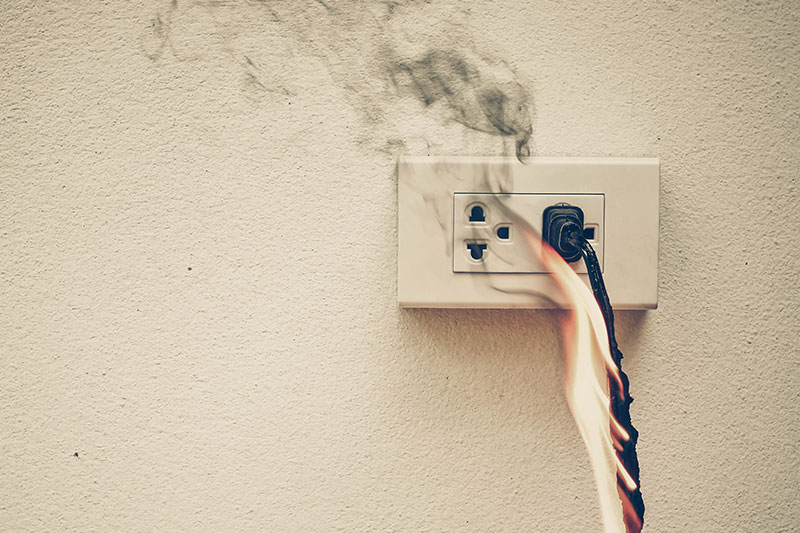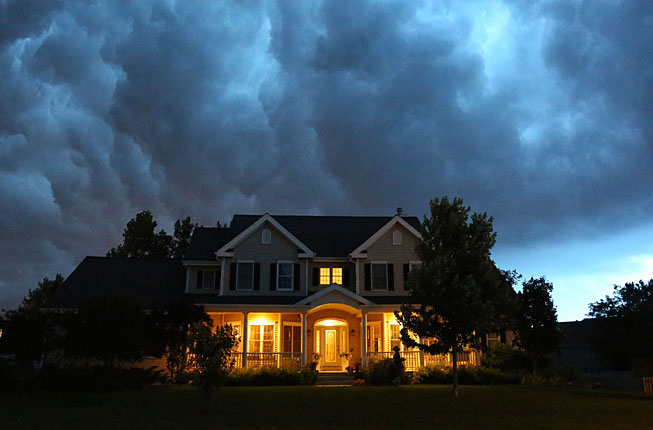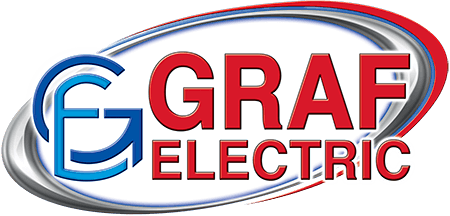Home electrical fires or electrocutions injure or kill thousands of people in the U.S. every year. The National Fire Protection Association (NFPA) reports there are an average of 50,000 home electrical fires each year, causing $1.3 billion in property damage and almost 1,400 injuries and 500 deaths. According to the U.S. Consumer Product Safety Commission, each year nearly 400 people across the U.S. are accidentally electrocuted.
Graf Electric technicians are trained in techniques to work safely with electricity, but here are some ways you can protect your family and home from electrical shock or fire.

Light Fixtures & Ceiling Fans
Fix wobbly or shaking ceiling fans by making sure they’re balanced and that they’ve been installed with the right kind of mount kit. Light fixtures that flicker on and off or frequently trip the circuit breaker should be repaired or replaced. Make sure you use the correct wattage light bulbs in your light fixtures.
Extension & Power Cords
Electrical cords and extension cords should never be run across a doorway or underneath a rug or carpet. This not only creates a tripping hazard, but walking on the cords could damage them. Large appliances like refrigerators, stoves, window air conditioners, washers and dryers should never be plugged in with extension cords or power strips. Check power cords and extension cords before plugging them in. If they’re frayed or damaged, don’t use them. Don’t overload outlets, extension cords or power strips by plugging too many things into them, and only use extension cords on a temporary basis. Make sure extension cords have safety closures to help prevent young children from electric shock hazards and mouth burn injuries.
Electrical Outlets & Switches
Don’t use an electrical outlet if the faceplate is warm to the touch. It could be overloaded or have a loose connection. Tighten loose outlets or switches. Use outlet covers in electrical receptacles that are accessible by young children.
To prevent electrocution, ground fault circuit interrupter (GFCI) outlets should be installed in any area where water and electricity may come into contact, like a kitchen or bathroom. When a GFCI senses a difference between the input and output of an electrical circuit, it cuts off power fast enough to prevent serious injury from electrical shock. Test GFCIs according to the manufacturer’s instructions monthly and after major storms to make sure they are working properly, and replace them if they keep tripping.
Consider having arc fault circuit interrupters (AFCIs) installed in your home. They help prevent electrical fires in the wiring behind your home’s walls. When an AFCI detects an arc fault, or electricity flowing along an unintended path, it quickly shuts down the circuit. The Electrical Safety Foundation International (ESFI) reports over 28,000 home fires a year in the U.S. are caused by arc faults. Like GFCIs, AFCI outlets should be tested monthly.
Circuit Breakers & Fuses
When replacing circuit breakers or fuses, always use the correct current size. If the breakers or fuses aren’t labeled with a current rating, an electrician can identify what size should be used. If a breaker keeps tripping immediately after it’s reset but the circuit’s not overloaded, contact a licensed electrician immediately. This indicates an electrical problem, and continuing to reset the breaker could start a fire.
Remodeling & Electrical Repairs
When remodeling or making home electrical repairs, or changing switches, outlets or light fixtures, make sure the power is off at the breaker or fuse box, and use tools with insulated grips. If you have to drill or cut into a wall, make sure you know where the electrical wiring and water pipes are located so you can avoid them.
Outside
When you’re working or playing outside, keep ladders, long-handled-tools, and kites away from overhead power lines. Make sure children know to check for overhead lines before climbing a tree.
Electrical Safety During a Storm or Power Outage
Kansans are no strangers to strong winds and thunderstorms which can knock down power lines and cause power outages. To avoid electrical shock, don’t use appliances, shower or bathe during an electrical storm. Protect electronics safe by plugging them into surge protectors, and consider having a whole-home surge protector installed.
If you have a backup generator, it should be properly installed by a licensed professional. Failure to do so can cause a backfeed shock, which is when electrical workers get electrocuted as power is restored to a home and electricity flows back out to the overhead power lines. When using a generator, prevent carbon monoxide poisoning by keeping it in a well-ventilated are that’s outside your home or garage. Learn more about residential backup generators.
If you see any downed power lines on the ground, assume they are live and call the local electric company or the fire department. Stay away from puddles or trees that are touching the wires, because they conduct electricity. If you’re in a vehicle and a power line falls on it, stay inside and wait for help. If you see someone else inside a vehicle with a downed wire on it, keep a safe distance and call for help.

What to Do During an Electrical Fire
It’s instinctive to throw water on a fire, but it’s extremely dangerous in the case of an electrical fire, because water is an electrical conductor. Instead, use a chemical fire extinguisher to put out the fire. Follow the P.A.S.S. method: Pull out the safety pin, Aim for the base of the fire, Squeeze the extinguisher handle, and Sweep back and forth until the fire goes out.
Call an Electrician Right Away For:
- Frequent blown fuses or tripped breakers
- Light fixtures that dim, flicker, or turn off and on by themselves
- Outlets that spark, feel warm, or are yellowed
- Electrical appliances that have a burning or hot rubber smell, or give you a tingling feeling
- Any buzzing or sizzling sounds in your home’s electrical system




